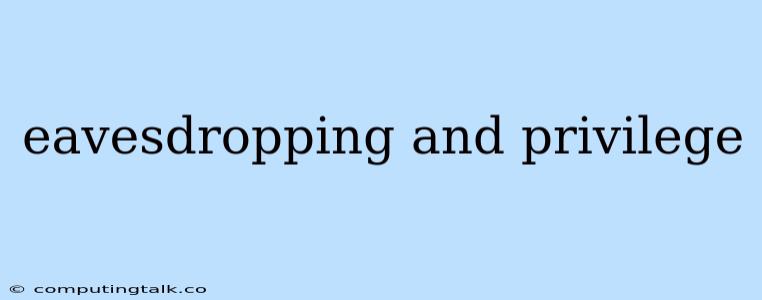Eavesdropping, the act of secretly listening to private conversations, is a violation of privacy that can have serious consequences. In many jurisdictions, eavesdropping is illegal and can result in criminal charges. However, there are certain exceptions to these laws, such as when law enforcement officials are conducting surveillance under a court order.
What is Eavesdropping?
Eavesdropping can take many forms, including listening to phone calls, intercepting emails, or using hidden cameras to record conversations. It can also involve using electronic devices to amplify sounds from a distance.
The Legal Consequences of Eavesdropping
The laws governing eavesdropping vary from jurisdiction to jurisdiction, but in general, it is illegal to intentionally listen to a private conversation without the consent of all parties involved.
Exceptions to Eavesdropping Laws
There are a number of exceptions to eavesdropping laws, including:
- Law enforcement surveillance: Law enforcement officials may be authorized to conduct surveillance under a court order.
- Consent: If all parties involved consent to being recorded, then eavesdropping is generally legal.
- Public places: Conversations that take place in public places are not considered private and are not protected by eavesdropping laws.
The Ethics of Eavesdropping
Even when eavesdropping is legal, it can still raise serious ethical concerns. Eavesdropping can be seen as a violation of trust and can damage relationships.
How to Protect Yourself from Eavesdropping
There are a number of steps you can take to protect yourself from eavesdropping, including:
- Be aware of your surroundings: Pay attention to who is around you and what they are doing.
- Use secure communication channels: When communicating sensitive information, use encrypted messaging services or make phone calls from a secure location.
- Be careful what you say: Don't discuss private matters in public places or in the presence of strangers.
Eavesdropping and Privilege
In some legal contexts, the concept of privilege can protect certain conversations from eavesdropping. Privilege protects confidential communications between certain individuals, such as lawyers and their clients, doctors and their patients, or spouses. These conversations are considered to be privileged and cannot be disclosed without the consent of the parties involved.
How to Prevent Eavesdropping
To prevent eavesdropping, it is essential to:
- Secure your devices: Ensure that your devices are password-protected and that you have updated security software.
- Use secure Wi-Fi networks: When using public Wi-Fi, be cautious about the information you share.
- Be cautious of your surroundings: Be aware of who is around you and what they are doing.
The Importance of Privacy
Privacy is a fundamental human right. Eavesdropping is a serious violation of privacy that can have significant consequences. It is important to be aware of the laws and ethics surrounding eavesdropping and to take steps to protect yourself from this invasive practice.
Conclusion
Eavesdropping is a serious issue that raises important legal, ethical, and social concerns. Understanding the legal and ethical ramifications of eavesdropping, as well as taking steps to prevent it, is crucial to protecting privacy and maintaining trust.
